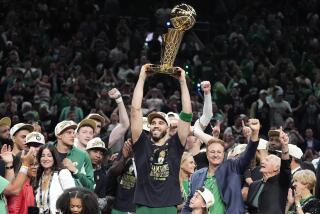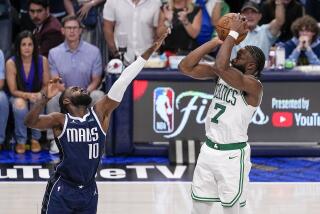Boston Garden Could Pass for White House
- Share via
BOSTON — Don’t bother trying to adjust the tint and contrast knobs on your TV set when you watch the Celtics and Rockets play, sports fans.
The Boston Celtics really do have a lot of white guys on their team. An astounding number, all things considered.
Eight white players on a 12-player roster. Three white starters. During one point early in the first half of Game 1 of the NBA championship series Monday, the Celtics had five white players on the court.
Then they made a substitution. Larry Bird checked in and the Celtics still had five white guys on the court.
So what? Aren’t we a little too sophisticated and progressive here in America in 1986 to be counting colors?
Maybe, but the truth is our society isn’t as colorblind as the idealists among us would like to imagine.
And the anachronism of a mostly white team dominating a mostly black sport is something that is noticed and commented upon by players and fans.
As Boston Coach K.C. Jones says: “It’s a white team in what is perceived as a racist city.”
The Celtics would make a neat little study for a sociologist. I’m just a columnist, so I’ll just tell you what people told me, and what I think about all these white guys on one team.
First of all, people do talk about it.
“You hear it all over the place,” says K.C. Jones, who is black, and who has final say on personnel matters. “You hear people say, ‘You need more blacks on the team. What are you going to do about this situation?’
“It sounds like they’re going to take me to court or something. . . . It would be a big deal if I did this on purpose, but I’m just trying to get the best basketball players I can, whether they’re green or blue.”
Where does Jones hear this kind of criticism?
“You hear it in barber shops, as you go around. . . . A lot of blacks (Celtic fans) have gone over to Philadelphia or L.A. teams.”
It’s difficult to say exactly at what point the beauty of racial pride crosses over to the ugliness of bigotry.
For instance, is it bad that scores of Latino baseball fans in Los Angeles rain their affection upon Fernando Valenzuela above all other Dodgers?
Is it bad that a segment of white sports fans in Boston have jumped on the Celtic bandwagon because the team’s leader and superstar, Larry Bird, is white?
Since Bird has come on the scene in Boston, the Celtic fan base has expanded considerably. Before Bird, Boston Garden sellouts were rare, even during the glory years; now, any available ticket is rare.
“If Bird were Magic (Johnson), the Celtics wouldn’t sell out,” says Bob Ryan of the Boston Globe, a long-time Celtic expert and observer.
“There wouldn’t be the fanaticism, no question. And it would be the same in any city in America.”
But Bob, what about Magic Johnson’s enormous popularity in Los Angeles?
“They (the Lakers) didn’t sell out every game and have a waiting list for season tickets,” Ryan says. “If you take Bird off this team and make it a 55-win team, they’d average 12,000 (in 14,890-seat Boston Garden). The fanaticism will disappear the minute he goes.”
That might be partly due to the fact that Bird, regardless of skin pigmentation, is one of the two or three greatest players ever to lace up a sneaker.
Still, Boston does have that image, of not being the nation’s flagship of racial harmony and brotherhood. When K.C. was a Celtic player, a popular star, he couldn’t buy a home in Framingham, and Bill Russell couldn’t buy a home in Lexington. Sorry, fellows, no blacks allowed in the suburbs.
Cedric Maxwell, who was in effect traded to the Clippers for Bill Walton after last season, was an outspoken critic of the city. Maxwell says now of Celtic center Robert Parish: “In Boston, he’s always going to be a scapegoat because he’s got four strikes against him--he’s black and he’s playing with three white superstars in Larry, Kevin and Bill Walton.”
That’s one man’s viewpoint, and maybe the city of Boston isn’t the racist hotbed some make it out to be. But sports-wise, the town’s two favorite teams have always been the Red Sox, for many years the whitest team in baseball, and the hockey Bruins.
And now, of course, the Celtics.
“There’s an element of the Boston crowd that loves the fact this team is white,” Ryan says. “That would be true of every city in America. I’ll tell you, and this is absolutely unsupportable, just my observation--the number-one most favorite act on the court is when (Kevin) McHale (a white Celtic forward) blocks any black guy’s shot. They (the segment of Garden fans) go crazy. They love seeing that.”
The obvious question is, did the Celtic front office do this on purpose? Did they build a white team in order to draw fans?
If so, that would make team President Red Auerbach somewhat of a racist.
“I would accuse Red of just about any crime I could think of,” one veteran NBA writer said. “But not that.”
Red is the wrong person to ask. He’s the wrong person to ask anything. Red is the world’s grumpiest man.
I asked him if people think the Celtics got white by design.
“I don’t give a bleep what people think,” Red said, which is something they can chisel on his tombstone someday.
“We do what we have to do,” he grumped. And that’s all he cared to say on the matter.
Before anybody labels Red a bigot, however, there are a few facts to consider. The Celtics, under Red Auerbach:
--Integrated the NBA, signing the first black player, Chuck Cooper.
--Hired the first black coach, Bill Russell.
--Had the NBA’s first all-black starting lineup (1964-65, the same season Philadelphia also had an all-black starting lineup).
--Were one of the first two teams (the Lakers under coach Fred Schaus being the other) to institute intentional interracial rooming on road trips, back in the early ‘60s.
Maybe none of this seems like a big deal, but the NBA wasn’t always the racially enlightened oasis it is now. As late as the early ‘60s, the league had an unwritten racial quota--two blacks per team. And if a black wasn’t good enough to start, he didn’t make the team. The substitutes were white guys.
This was partly out of owner-perceived economic necessity. The owners then were small-time businessmen struggling to keep their teams alive, and they believed too many blacks would keep the fans away.
So into this unfortunate sea of bigotry sailed the brave Celtics with their attitude of damn the quotas, full speed ahead.
Isn’t it funny, then, that this team is being saluted by some as basketball’s version of the great white hope?
It’s almost impossible to build a case against Celtic management. The white players they have are legit. Bird and McHale start for any team on the planet Earth. Danny Ainge was highly coveted by all NBA teams when he was first available and has developed into a fine guard.
Bill Walton could get a job right now coming off the bench in 22 other NBA cities. So could Scott Wedman.
Jerry Sichting fits his role as a part-time shooter perfectly. And the Celtics certainly don’t sell any tickets by having white guys Greg Kite and Rick Carlisle sitting on the bench. I couldn’t find a single person who thinks the Celtics got white by anything but coincidence or accident or pure chance.
But it’s kind of a sore topic around the front office, this racial mix thing. When Sly Williams, a black reserve, was waived during the season, the Celtics filled his 12th man spot with David Thirdkill, a black.
“The Celtics were so sensitive to this race thing by then, that even if a white superstar had been available, they wouldn’t have touched him,” says a Boston sportswriter. “I really think that (race) was a consideration.”
Crazy, isn’t it?
But now that it’s out in the open, now that we’ve noticed how white the Celtics are and discussed it like the clear-headed adults we all are, we can sit back and enjoy the rest of the NBA championship series and ignore this black and white business.
Right?
More to Read
Go beyond the scoreboard
Get the latest on L.A.'s teams in the daily Sports Report newsletter.
You may occasionally receive promotional content from the Los Angeles Times.










